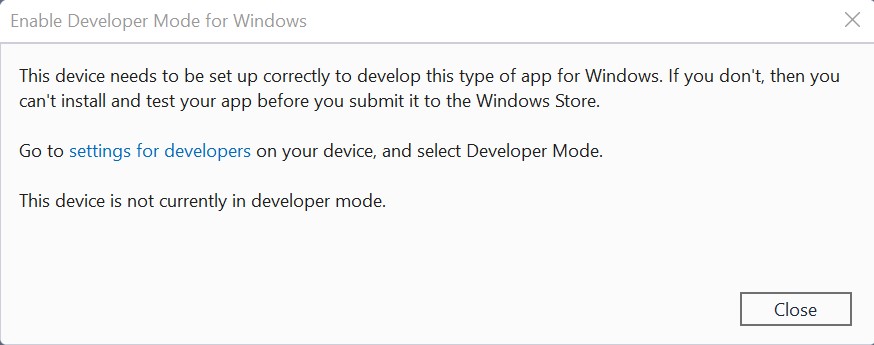Nuta
Dostęp do tej strony wymaga autoryzacji. Możesz spróbować się zalogować lub zmienić katalog.
Dostęp do tej strony wymaga autoryzacji. Możesz spróbować zmienić katalogi.
Strona Zaawansowane systemu > w ustawieniach systemu Windows zawiera tryb dewelopera i dodatkowe funkcje, których można użyć, gdy tryb dewelopera jest włączony. Tryb dewelopera umożliwia odblokowywanie narzędzi, ustawień i funkcji przeznaczonych do tworzenia, wdrażania i testowania aplikacji w systemie Windows.

Uwaga / Notatka
Przed systemem Windows 11 25H2 te ustawienia są wyświetlane na stronie Dla deweloperów w ustawieniach systemu Windows. W systemie Windows 11 25H2 lub nowszym są one wyświetlane w sekcji Dla deweloperów na stronie Ustawienia zaawansowane .
Włącz tryb dewelopera
Jeśli piszesz oprogramowanie w programie Visual Studio , musisz włączyć tryb dewelopera zarówno na komputerze dewelopera, jak i na wszystkich urządzeniach, których będziesz używać do testowania kodu.
Ważne
Jeśli używasz komputera do zwykłych codziennych działań (takich jak gry, przeglądanie internetowe, poczta e-mail lub aplikacje pakietu Office), nie ma potrzeby aktywowania trybu dewelopera. Jeśli próbujesz rozwiązać problem z komputerem, zapoznaj się z pomocą systemu Windows.
Aby włączyć tryb dewelopera lub uzyskać dostęp do innych ustawień:
Otwórz pozycję Ustawienia systemu Windows.
Wyszukaj pozycję Zaawansowane lub przejdź do pozycji >, a następnie przewiń do sekcji Dla deweloperów.
Przełącz ustawienie Tryb dewelopera w górnej części sekcji Dla deweloperów .
Przeczytaj zastrzeżenie. Kliknij przycisk Tak , aby zaakceptować zmianę.

Uwaga / Notatka
Włączenie trybu dewelopera wymaga dostępu administratora. Jeśli urządzenie jest własnością organizacji, ta opcja może być wyłączona.
Jeśli spróbujesz skompilować projekt systemu Windows w programie Visual Studio, gdy tryb dewelopera nie jest włączony, w programie Visual Studio zostanie wyświetlone następujące okno dialogowe:

Jeśli widzisz to okno dialogowe, wybierz ustawienia dla deweloperów, aby otworzyć stronę Ustawienia zaawansowane systemu>.
Uwaga / Notatka
W dowolnym momencie możesz przejść do strony Ustawienia zaawansowane , aby włączyć lub wyłączyć tryb dewelopera.
Funkcje trybu dewelopera
Tryb dewelopera zastępuje wymagania dotyczące licencji dewelopera. Oprócz ładowania bocznego, ustawienie Tryb dewelopera umożliwia debugowanie i dodatkowe opcje wdrażania. Obejmuje to uruchomienie usługi SSH w celu umożliwienia wdrożenia na tym urządzeniu. Aby zatrzymać tę usługę, należy wyłączyć tryb dewelopera.
Po włączeniu trybu dewelopera na pulpicie jest instalowany pakiet funkcji, w tym:
- Portal urządzeń z systemem Windows: portal urządzeń jest włączony (a reguły zapory są dla niego skonfigurowane tylko wtedy, gdy opcja Włącz portal urządzeń jest włączona.
- Instaluje i konfiguruje reguły zapory dla usług SSH, które umożliwiają zdalną instalację aplikacji. Włączenie odnajdywania urządzeń spowoduje włączenie serwera SSH.
Uwaga / Notatka
Portal urządzeń i odnajdywanie urządzeń są przydatne w przypadku konieczności tworzenia aplikacji na jednej maszynie, ale wdróż aplikację na innej maszynie na potrzeby testowania. Jeśli na przykład musisz wdrożyć aplikację na tablecie w celu przetestowania interfejsu użytkownika tabletu zoptymalizowanego pod kątem dotyku.
Portal urządzeń
Aby dowiedzieć się więcej na temat portalu urządzeń, zobacz Omówienie portalu urządzeń z systemem Windows i Portal urządzeń dla komputerów stacjonarnych.
Odnajdywanie urządzeń
Po włączeniu funkcji odnajdywania urządzeń zezwalasz urządzeniu na wyświetlanie innych urządzeń w sieci za pośrednictwem sieci mDNS. Ta funkcja umożliwia również uzyskanie numeru PIN SSH na potrzeby parowania z urządzeniem przez naciśnięcie przycisku Paruj widocznego natychmiast po włączeniu odnajdywania urządzeń. Ten monit o podanie numeru PIN musi być wyświetlany na ekranie, aby ukończyć pierwsze wdrożenie programu Visual Studio przeznaczone dla urządzenia.

Należy włączyć odnajdywanie urządzeń tylko wtedy, gdy planujesz ustawić urządzenie jako cel wdrożenia. Jeśli na przykład używasz portalu urządzeń do wdrażania aplikacji na tablecie na potrzeby testowania, musisz włączyć odnajdywanie urządzeń na tablecie, ale nie na komputerze dewelopera.
SSH
Usługi SSH są włączone po włączeniu odnajdywania urządzeń na urządzeniu. Jest to używane, gdy urządzenie jest obiektem docelowym wdrożenia zdalnego dla aplikacji spakowanych MSIX. Nazwy usług to SSH Server Broker i SSH Server Proxy.
Uwaga / Notatka
Nie jest to implementacja openSSH firmy Microsoft, którą można znaleźć w witrynie GitHub.
Aby móc korzystać z usług SSH, możesz włączyć odnajdywanie urządzeń, aby zezwolić na parowanie numerów PIN. Jeśli zamierzasz uruchomić inną usługę SSH, możesz je skonfigurować na innym porcie lub wyłączyć usługi SSH trybu dewelopera. Aby wyłączyć usługi SSH, wyłącz odnajdywanie urządzeń.
Logowanie za pomocą protokołu SSH odbywa się za pośrednictwem konta DevToolsUser , które akceptuje hasło do uwierzytelniania. To hasło jest numerem PIN wyświetlanym na urządzeniu po naciśnięciu przycisku Odnajdowanie urządzenia Parowanie i jest ono prawidłowe tylko podczas wyświetlania numeru PIN. Podsystem SFTP jest również aktywowany do ręcznego zarządzania folderem DevelopmentFiles, w którym są instalowane luźne pliki do wdrożenia z programu Visual Studio.
Zastrzeżenia dotyczące użycia protokołu SSH
Istniejący serwer SSH używany w systemie Windows nie jest jeszcze zgodny z protokołem. Użycie protokołu SFTP lub klienta SSH może wymagać specjalnej konfiguracji. W szczególności podsystem SFTP działa w wersji 3 lub mniejszej, więc każdy klient łączący powinien być skonfigurowany tak, aby oczekiwał starego serwera. Serwer SSH na starszych urządzeniach używa ssh-dss do uwierzytelniania za pomocą klucza publicznego (co w OpenSSH zostało uznane za przestarzałe). Aby nawiązać połączenie z takimi urządzeniami, klient SSH musi być ręcznie skonfigurowany tak, aby akceptował ssh-dsselement .
Windows developer
